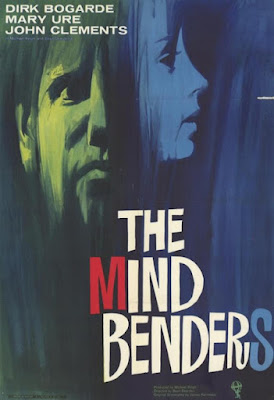Generally regarded as one of the first true paranoid thrillers, John Frankenheimer's "The Manchurian Candidate" dealt with the brainwashing of a Korean War POW (Laurence Harvey whose steely eyed presence seemed like the perfect tonic for an empty vessel) and his subsequent mission as a presidential assassin. It holds up even better today.
Released just a year later in 1963, Basil Dearden's "The Mind Benders" certainly hasn't gotten the same acclaim as Frankenheimer's effort, but it's no less terrifying. I'd even argue it's a much more insidious example of the ability of one human to crack open and infect the brain of another human. In Dearden's stratosphere, the purpose isn't world domination, but simply the nature of suggestion in wielding power over another.... which plays havoc and begins the dissolution of a happy marriage.
As he did a few years prior in Dearden's taboo breaking "Victim" (1961), Dirk Bogarde is the man placed in a precarious situation fighting for his very soul. Portraying Dr. Longman, Bogarde is a scientist involved in an experiment whose opening title card suggests the entire story is ripped from the annuls of American research documents involving isolation tanks and perception reduction. And if this doesn't sound so far out today where such tactics dot the fringe landscape of psychology, things don't start so well for one doctor involved in the experiment who rightly tosses himself off a moving train in the film's opening minutes.Hoping to find out if this strange death is a matter of political subterfuge or just someone unable to deal with his own mind, Major Hall (John Clements) asserts himself in the experiment and convinces a research aide (Michael Bryant) to help him push the boundaries of isolation. Enter Henry Longman (Bogarde), another doctor on the experiment who volunteers to stay submerged for the longest amount of time possible.... a stoic step for science and the perfect excuse for Major Hall to play with his own limits of twisted psychology.
After a terrific paranoid-filled first half, "The Mind Benders" turns chamber-piece driven in the second half. The slight suggestions whispered about his wife (a wonderful Mary Ure) moments after a hectic decompression from 7 hours in the tank turns the film into an acidic story about the slow dissolution of self and relationships. Bogarde doesn't always drip with empathy in many screen roles, but here, he really allows the snide distrust to leak off the screen..... even as his wife is 8 months pregnant and struggling just to understand the seismic shift in her once loving husband.
This abrupt shift from tangential science fiction elements feels odd at first, but once "The Mind Benders" settles on Longman and his wife's shifting power dynamic, the film's kitchen sink realism (a style dominating much of British cinema during this time) feels all the more powerful in showing how disruptive progressive science can be. He's not slated to kill a presidential candidate, but the final riverside boat party seems just as violent for the way he openly courts another woman (Wendy Craig) and flagrantly challenges the tenets of marriage. Longman's brainwashing may not be the equal of murder, but "The Mind Benders" makes a strong case that its something far more damaging.
Perhaps best known for the aforementioned "Victim" and the first film in his own production company, "The League of Gentlemen" (1960), Dearden isn't an extremely well known filmmaker, mostly noticed for his social justice films of the 50's and early 60's. While "The Mind Benders" doesn't seem to have a great cause, it's no less thrilling for how it utilizes genre to twist and burn into an expert examination on psychology. Based on the handful of films I've seen, Dearden deseres to be mentioned in the same breath as other contemporary artists of his time.

No comments:
Post a Comment